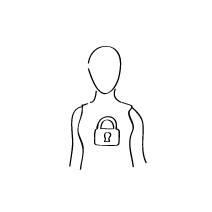
Victims have the right to be protected against all acts that might jeopardize their physical and emotional wellbeing, security and privacy because of their participation in criminal proceedings.
This right also applies to the victim’s close relatives and/or the witnesses.
An example of a situation that may jeopardize the safety, welfare, and privacy of the victim, is bullying or threats made by other people involved in the process (such as the defendant or people close to them).
If you are or you were the victim of a crime, you can request or suggest protection measures for you and/or your family. Witnesses may also do so.
APAV can help you exercise this right. Click here to find out where we are and how you can contact us. If you prefer, you can send us a quick message. Click here to send a message.
Restrictive measures

Restrictive measures are measures restricting the freedom of the defendant.
They can be imposed during the criminal proceedings if there is a verified risk that the defendant might flee, risk to the collection and preservation of evidence, danger to public order and/or a risk of continued criminal activity.
There are several kinds of restrictive measures, for example:
- the defendant cannot change residence or be absent for more than five days without first informing the police. This is called declaration of identity and residence;
- the defendant must periodically report in person to police station in the area where they live;
- the defendant must suspend their professional activity, functions, activities and rights, in which, for example, the accused is forbidden to go to work, or to exercise parental responsibilities;
- the defendant is banned from contacting or approaching the victim;
- the defendant must to remain in their registered residence, with or without electronic monitoring;
- provisional detention, in which the defendant is imprisoned pending the outcome of the process.
Protection measures for the victim and other witnesses

When necessary, measures may be taken by the authorities to protect the identity, privacy, and security of the victim.
Some examples:
- The statements made by the victim during the investigation may be recorded, so that they can serve as evidence at trial, and in so, preventing the victim from having to expose themselves and repeat the story of their victimization.
- Holding the trial, which in principle is public, behind closed doors.
- The removal of the defendant from the courtroom while the victim is testifying.
- Banning the publication of the victim's identity by the media
- The adoption of measures such as separate waiting areas to prevent the victim from coming in contact with the defendant and their relatives
- Concealment: the Court may prevent the victim from being recognized and identified by the people present in the courtroom by using image concealment and/or voice distortion while the victim is being heard.
- Videoconference: the Court may have the victim testify in a different room from the courtroom. Their statements can be seen and heard through an audio-visual connection to the courtroom where the trial is taking place
It is important to remember that:
Some of these protective measures are exceptional: they only apply if they are absolutely necessary to ensure the protection of the people involved in the process.
Victims with special protection needs

A victim with special protection needs is one that, according to their personal characteristics, the type or nature of the crime they suffered and/or the circumstances in which it occurred, is particularly vulnerable to continued violence, intimidation and inappropriate treatment, and therefore requires special care, especially in terms of protection.
Children are considered particularly vulnerable victims or witnesses.
The judicial authorities should make special provisions to protect particularly vulnerable victims or witnesses.
Some of these provisions are:
- the victim and/or witness should be accompanied by a qualified professional, such as a victim support officer;
- the victim and/or witness should have access to psychological support;
- the statement of the victim and/or witness should be taken as soon as possible;
- victims of sexual violence, gender-based violence or violence in close relationships, should be heard by a person of the same sex, if they so wish;
- the victim and/or witness should be protected from having to meet or come across certain participants, namely the defendant;
- the victim and/or witness should be heard using means of concealment or teleconference and can even not be present in the courtroom;
- In some cases, the procedural acts, including the trial, take place pass without the presence of public.
APAV can help you exercise this right. Click here to find out where we are and how you can contact us. If you prefer, you can send us a quick message. Click here to send a message.
